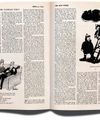Prøve GULL - Gratis
THE INSTIGATOR
The New Yorker
|May 20, 2024
How Miranda July starts again.

Miranda July is good at plot. Stories will come to her fully formed, like a gift from the gods; all she has to do is unwrap them. In her Los Angeles office, a little house where she keeps more than three decades’ worth of papers, photographs, awards, cassette tapes, and costumes, is a notebook that she filled in a single feverish train ride with the bones of her first feature film, “Me and You and Everyone We Know” (2005). Something similar happened with her first novel, “The First Bad Man” (2015), and with her latest movie, “Kajillionaire” (2020): a sudden vision, a pause to ponder, then a rush to get it all down. July is a director, a performer, and an artist who likes to work in media that do not seem to be media at all until she shows up to exploit their latent possibilities. She has opened an interfaith charity shop in a fancy London department store and created an app that allows strangers to deliver intimate messages and narrated the inner monologues of models during an Hermès fashion show. But she thinks of herself, first and foremost, as a writer. Sometimes, on a film set, an actor will improvise a line and she will have to tell him, No, please stick to the script. She knows what she means to say.
In the fall of 2017, July started to feel a second novel coming on. This time, though, she wanted to do things differently, to embrace the mystery of not knowing—what the writer Grace Paley called “the open destiny of life”—for as long as she could. “I felt like there was a way in which one’s anxiety is very calmed by having a plot,” she told me recently. “You feel safe. And there’s a way in which working like that can limit things if you have what you think of as a good idea too early.”
Denne historien er fra May 20, 2024-utgaven av The New Yorker.
Abonner på Magzter GOLD for å få tilgang til tusenvis av kuraterte premiumhistorier og over 9000 magasiner og aviser.
Allerede abonnent? Logg på
FLERE HISTORIER FRA The New Yorker

The New Yorker
Rachel Cusk on Muriel Spark's "The House of the Famous Poet"
I never felt the influence of Muriel Spark, despite that a substantial female figure in British literature.
3 mins
September 1- 8, 2025 (Double Issue)
The New Yorker
SURROUND SOUND BANG! BOING! SPLAT!
The actor and comedian Fred Armisen phoned the front desk from his room at a midtown hotel the other day, and asked the clerk to call right back.
3 mins
September 1- 8, 2025 (Double Issue)

The New Yorker
PRAY, LOVE, REPEAT
The epiphanies of Elizabeth Gilbert.
13 mins
September 1- 8, 2025 (Double Issue)

The New Yorker
COMMENT- THE CULTURAL TURN
In 1976, the year the United States celebrated its bicentennial, Donald J.Trump, thirty, leonine, and three-piecesuited, was chauffeured around Manhattan by an armed laid-off city cop in a silver Cadillac with \"DJT\" plates, while talking on his hot-shot car phone and making deals.
4 mins
September 1- 8, 2025 (Double Issue)

The New Yorker
EVERYTHING NICE
How music criticism lost its edge.
17 mins
September 1- 8, 2025 (Double Issue)
The New Yorker
STORYTELLING DEPT. SWEATING IT
On the hottest day in New York City in a decade, nearly a hundred people crowded into a hundred-andseventy-degree sauna in a converted brewery in Williamsburg for the first U.S. National Aufguss Competition.
3 mins
September 1- 8, 2025 (Double Issue)

The New Yorker
ON THE HUSTINGS ZOHRAN IRL
If, as Mario Cuomo once said, you campaign in poetry and you govern in prose, then New York's mayoral race has birthed some new kind of TikTokian free verse.
3 mins
September 1- 8, 2025 (Double Issue)
The New Yorker
PROJECT
A little while ago, I told the actor M that I was thinking of writing her autobiography. She liked the idea. She's a good sport. Would you just make it up? she said.
19 mins
September 1- 8, 2025 (Double Issue)

The New Yorker
UNDER THE HAMMER
Can Sotheby's survive its billionaire owner?
45 mins
September 1- 8, 2025 (Double Issue)

The New Yorker
GOING VIRAL
Patricia Lockwood's quest to salvage her mind, body, and art from sickness.
30 mins
September 1- 8, 2025 (Double Issue)
Listen
Translate
Change font size
